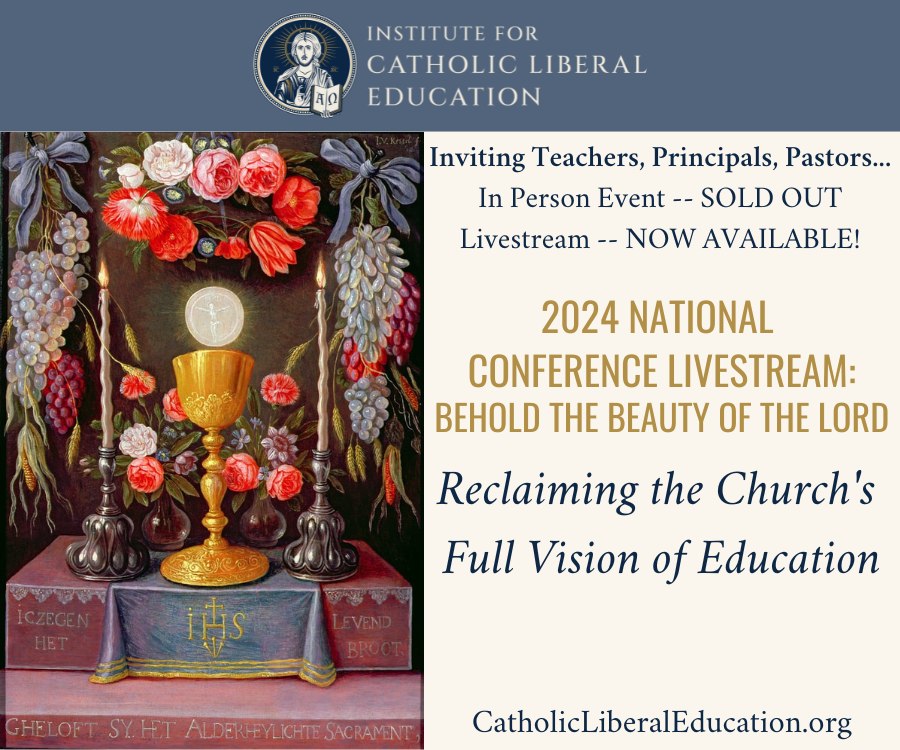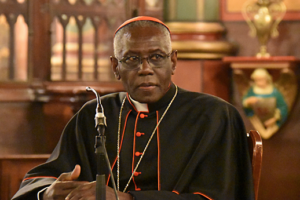Address by Cardinal Sarah at the Napa Institute—…My address – “The Catholic Church’s Enduring Answer to the Practical Atheism of our Age” – reflects well your mission: to prepare leaders to bring truth, faith, and value into the modern world through liturgy, formation, and community.
First, however, I would like to say something about the Catholic Church here in the United States. I have had the privilege of traveling to your country many times and I have found it a place of great importance for the universal Church. The United States is part of what is commonly called “the West”. The West, while not the birthplace of Christianity, is the home of much of what was once called Christendom, and much of what has become modern society, the roots of which are firmly European. 
The cultural, economic, political, and, to a lesser extent, religious identity of America track in broad strokes to that of Europe. While America is the fruit of European faith and enlightenment, nonetheless it is unique in many significant ways.
With respect to the Catholicism of the United States, it is well known that Catholics were for a long time a recognizable minority. Catholics went to different churches and schools; they fasted on Fridays; they celebrated the holy days differently; they often lived in ethnic neighborhoods. In short, Catholics were different. Nonetheless, they were also proudly American. Their faith inspired a patriotism. In World War II, Catholics fought and died for freedom alongside their Protestant and Jewish brothers and sisters. It was the faith of Catholics that inspired such sacrifice. They were a religious minority, firm in the faith, even if treated as second class citizens at times, or worse.
Since the 1960’s Catholics have increasingly lost their unique identity. They are no longer a recognizable minority because they have fully assimilated into American culture. Catholics here are often American first, Catholic second.
The consequences are obvious. Many Catholics hold the same beliefs as the general population. You have a self-identified Catholic President who is an example of what Cardinal Gregory recently described as a “Cafeteria Catholic”. Many of your Catholic public officials are in the same category. Many of your Catholic hospitals and universities are Catholic in name only. The minority status of so many things Catholic here in the United States, which provided an important witness to the fullness of our Catholic faith, has been traded for cultural assimilation.
I have visited the United States enough to know that, while the uniqueness of the Catholic community has been lost at a macro level, there is much to celebrate about specific aspects of the Catholic community here. The Catholic Church of the United States is very different from the Church in Europe. The faith in Europe is dying, and in some places it is dead. The interaction between severely secular governments and the Church have not served the faith well there.
Some of that exists in the United States but there is also a dynamism of faith here that does not exist in other places in the West. I have seen it firsthand. As President of the Pontifical Council Cor Unum, I witnessed personally how Americans are amongst the most generous people in the world. Thank you. Your seminaries have largely been reformed, lay apostolates are breathing new life into the faith, in parishes there are pockets of life, and my sense is that your episcopal leadership is generally committed to the Gospel, faith in Jesus Christ, and a preservation of our Sacred Tradition. No doubt there are divisions and internal conflict, but there is not a wholesale rejection of the Catholic faith as we see in many parts of Europe and South America. My observation is that there are models of faith here in the United States that could perhaps be a lesson for other western countries.
With that being said, your culture more broadly speaking has become hostile to the faith. There is a practical atheism that has taken over your country and is threatening the common good. This is what I would like to reflect on with you today: the practical atheism that is infecting the West and slipping noticeably into the Church herself.
II. Practical Atheism
As I noted in a recent address to the Bishops of Cameroon:
“Many Western prelates are paralyzed by the idea of opposing the world. They dream of being loved by the world. They have lost the concern of being a sign of contradiction. Perhaps too much material wealth leads to compromise with world affairs. Poverty is a guarantee of freedom for God. I believe that the Church of our time is experiencing the temptation of atheism. Not intellectual atheism. But this subtle and dangerous state of mind: fluid and practical atheism. The latter is a dangerous disease even if its first symptoms seem mild.”
By practical atheism, I mean a loss of the sense of the Gospel and the centrality of Jesus Christ. Scripture becomes a tool for a secular purpose rather than the call to conversion. I do not think this is widespread among your bishops and priests here in the United States,  thanks be to God, but it is becoming more common among other regions of the West. Too many do not take the faith seriously and treat it as a hindrance to dialogue.
thanks be to God, but it is becoming more common among other regions of the West. Too many do not take the faith seriously and treat it as a hindrance to dialogue.
St. Paul warned us of this: “For the time will come when people will not tolerate sound doctrine but, following their own desires and insatiable curiosity, will accumulate teachers and will stop listening to the truth and will be diverted to myths” (2 Tim 4:3-4).
And yet we know that the faith, and Scripture and the sacraments in particular, give us life. That’s why St. Paul also charged us to, “proclaim the word; be persistent whether it is convenient or inconvenient; convince, reprimand, encourage through all patience and teaching” (2 Tim 4:2).
There is, of course, no pure atheism. One must put his or her trust in something. So, the question is not whether you believe in God or not, but what do you believe in; what is your lower-case “g” – god? For many in the secular culture, it is sex and all its libertarian derivatives. For others, it is a positivist understanding of nature, where objective data is the only factor by which decisions should be made. And yet for others, it is wealth or power or social status or social activism.
All of these are corrupt and false idols by which we elevate something other than the one, true God, in all His majesty, love and mercy—just as the Israelites worshipped the Golden Calf. This is nothing new. Creation, in its many forms, has always competed with the Creator for our loyalty. What is of particular interest is how this sort of practical atheism has seeped into the Church. I would like to review what our three most recent popes have said about this as a reminder that the Church is the prophetic voice for our times and we must remain vigilant to voices from within that wish to alter her voice to something palatable to secular culture.
III. Saint Pope John Paul II
The great Pope Saint John Paul II understood the dangers of atheism as well as anyone. He lived through the horrors of a political system disconnected from God and all its consequences. While many of the horrors of atheistic communism and fascism happened within our lifetime, or at least within my lifetime, we seem to have forgotten its brutal lessons.
Millions, perhaps hundreds of millions, of lives were sacrificed for ideological purposes driven by a loss of the sacred. We all know that family, human life, the dignity of the human person created in the image of God, and after His likeness, are the most sacred of all living creatures. Nonetheless, murder, torture, rape, families torn apart, and so many other horrific sins against the dignity of the person were committed in the name of lies that separate man from God.
Saint John Paul understood all of this and leveraged the weapons of faith against the atheism that emanated from communism and the East. On one level, he won that war but, at another level, the war continues at a global and national level— and even within each one of us. As Solzhenitsyn described it, “the line separating good and evil passes not through states, nor between classes, nor between political parties either—but right through every human heart—and through all human hearts.” This is the battle each one of us faces and even the Church experiences it in an eschatological way. The battle is not “out there” but here, starting within each one of us.
This localization of the distancing from God is something each of us must examine on a regular basis. In what or whom do we find meaning? As I have said elsewhere: it must be God, otherwise we are left with nothing.
“God or nothing,” is the title of one of my books. This is true for each one of us but also for the Church herself.
In a 1999 General Audience, Pope John Paul spoke about a practical atheism that can be applied to some in the Church today:
“Starting with Sacred Scripture, we immediately note that there is no mention of ‘theoretical’ atheism, while there is a concern to reject ‘practical’ atheism…. Rather than atheism, the Bible speaks of wickedness and idolatry. Whoever prefers a series of human products, falsely considered divine, living and active, to the true God is wicked and idolatrous.”
We see this in the Church when sociology or “lived experience” becomes the guiding principle that shape moral judgment. It is not an outright rejection of God, but it pushes God to the side. How often do we hear from theologians, priests, religious, and even some bishops or bishop conferences that we need to adjust our moral theology for considerations that are solely human?
There is an attempt to ignore, if not reject, the traditional approach to moral theology, as defined so well by Veritatis Splendor and the Catechism of the Catholic Church. If we do, everything becomes conditional and subjective. Welcoming everyone means ignoring Scripture, Tradition, and the Magisterium.
None of the proponents of this paradigm shift within the Church reject God outright but they treat Revelation as secondary, or at least on equal footing with experience and modern science. This is how practical atheism works. It does not deny God but functions as if God is not central.
We see this approach not only in moral theology but also in liturgy. Sacred traditions that have served the Church well for hundreds of years are now portrayed as dangerous. So much focus on the horizontal pushes out the vertical, as if God is an experience rather than an ontological reality.
————-
————–
There is an implied understanding by the proponents of practical atheism that faith somehow limits the person. They take St. Irenaeus’ axiom – “the glory of God is man fully alive” – to mean the highest end of man is to be fully himself. This is true if we understand man as a creature made for God, but the practical atheists see God and his moral order as a limiting factor. Our happiness, according to this way of thinking, is found in being who we want to be, rather than conforming ourselves to God and his order.
It is all very “now” oriented. What has meaning is that which speaks to the contemporary moment, divorced from our individual and corporate history. This is why the traditions of our faith can be so easily dismissed. According to the practical atheists, tradition is binding, not freeing.
And yet it is through our traditions that we more fully know ourselves. We are not isolated beings unconnected to our past. Our past is what shapes who we are today.
Salvation history is the supreme example of this. Our faith always echoes back to our origins, from Adam and Eve, through the kingdoms of the Old Testament, to Christ as the fulfillment of the old law, to the advent of the Church and the development of all that was given to us from Christ. This is who we are as a Christian people. It is all radically connected. We are a people who live within the context of who God created us to be, which has been received more deeply over the centuries but is always connected to the revelation of Christ, who is the same yesterday and today. To pursue fulfillment by lowering our sights to our experience, emotions, or desires is to reject who we are as God’s creatures, endowed with sublime dignity and created ultimately for Him.
IV. Pope Benedict XVI
This brings us to Pope Benedict XVI. He, too, understood firsthand the dangers of atheism, explicit or implicit. His work as theologian, prefect, and pope had a particular emphasis on the life of faith in Europe, which he sought to renew. He understood the West was under attack from an atheism within the traditionally Christian cultures of Europe.
He was even more explicit than John Paul about his concerns regarding the loss of faith within the Church. As pope he said:
“A particularly dangerous phenomenon for faith has arisen in our times: indeed, a form of atheism exists which we define, precisely, as ‘practical’, in which the truths of faith or religious rites are not denied but are merely deemed irrelevant to daily life, detached from life, pointless. So it is that people often believe in God in a superficial manner, and live ‘as though God did not exist’ (etsi Deus non daretur). In the end, however, this way of life proves even more destructive because it leads to indifference to faith and to the question of God” (General Audience, November 14, 2012).
In a 1958 lecture, years before Vatican II, which suggests our current situation has roots much deeper than the cultural revolution of the 1960’s and 1970’s, he said:
“This so-called Christian Europe for almost four hundred years has become the birthplace of a new paganism, which is growing steadily in the heart of the Church and threatens to undermine her from within.”
The Church, he continued, “is no longer, as she once was, a Church composed of pagans who have become Christians, but a Church of pagans who still call themselves Christians, but actually have become pagans. Paganism resides today in the Church herself” (The New Pagans in the Church, 1958)
This is a harsh critique of the Church, and yet this was said back in 1958, so the criticism that there exists a practical atheism in the Church is not new to this moment. It is, nonetheless, more apparent now than it was when Joseph Ratzinger made these observations and it comes in the loss of devout Christian living, or an obvious Christian culture, and in the form of public dissent, sometimes even from high-ranking officials or prominent institutions.
How many Catholics attend weekly Mass? How many are involved in the local church? How many live as if Christ exists, or as if Christ is found in his or her neighbor, or with the firm belief that the Church is the Mystical Body of Christ? How many priests celebrate the Holy Eucharist as if they are truly alter Christus, and, even more so, as if they are ipse Christus – Christ Himself? How many believe in the Real Presence of Jesus Christ in the Holy Eucharist? The answer is too few. We live as if we do not need redemption through the blood of Christ. That is the practical reality for too many in the Church. The crisis is not so much the secular world and its evils, but the lack of faith within the Church.
The synodal process, particularly in a few European countries, is an example where…read full text here
RELATED RESOURCES:
- God or Nothing, Cardinal Robert Sarah
- Veritas Splendor, encyclical by Saint Pope John Paul II
- Catechism of the Catholic Church





You must be logged in to post a comment.